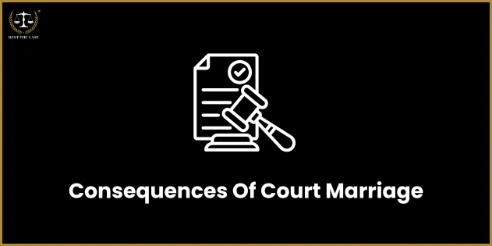Know The Law
Consequences Of Court Marriage In India

2.3. Child Custody And Support
2.5. Implications For Immigration And Visa Applications
3. Conclusion 4. FAQs4.1. Q1. What is the mandatory notice period for a court marriage?
4.2. Q2. Can anyone object to a court marriage?
4.3. Q3. How are divorce and child custody handled in court marriages?
4.4. Q4. Are inheritance rights recognized in court marriages?
4.5. Q5. Is the marriage certificate issued after a court marriage valid for immigration purposes?
Court marriage in India offers a secular and legally recognized alternative to traditional religious ceremonies. While there are many other benefits to court marriage, one should look into the consequences and legalities involved therein. The article elaborates on the various aspects of court marriage, such as its legal validity, possible disadvantages, and the implications of divorce, child custody, succession rights, and immigration.
What Is Court Marriage?
The marriage between the couple in a court marriage is solemnized before a Marriage Registrar, rather than in front of religious symbols. Interfaith marriage or inter-caste marriage couples, or couples who prefer a simpler, non-religious marriage, tend to favor this form of marriage. Court marriages in India are governed by the Special Marriage Act of 1954, dictating that the legal act of marriage registration can be done according to this act, irrespective of the religion of the couple.
Disadvantages Of Court Marriage In India
The disadvantages of court marriages in India are as follows:
Legal Recognition
Many factors, such as the validity of court marriages and the issuance of court certificates, affect the legal recognition of court marriages in India.
- Bureaucratic Delays: This procedure can be time-consuming, comprising several visits to the registrar's office, as per strict processes. The delay in certificate issuance can, therefore, destroy the possibility of upcoming marital benefits.
- Public Notice Requirement: The obligatory 30-day period for public advice may reveal the couple's intentions to their family and society and expose them to unnecessary interference or even objections. It could become a difficult situation, especially in the case of interfaith or inter-caste marriages, whereby families develop opposition.
Also Read : Step-by-Step Court Marriage Process In Nagpur
Consequences Of Divorce
Divorce proceedings can be lengthy, emotionally draining, and often contentious due to complex legal procedures, property disputes, custody battles, and financial disagreements.
- Lengthy Divorce Proceedings: Once the marriage comes to an end in the event of divorce, that legal process can be very long and emotionally draining. Court divorces are often subject to complex legal procedures due to various disputes arising over property, custody, etc.
- Potential For Contentious Disputes: Divorce proceedings can become a hostile situation, leading to long legal battles and emotional distress. Financial disputes become very complicated, and asset divisions are not easy.
Child Custody And Support
Court-determined custody and child support often lead to tension and disputes between parents, with disagreements over custody arrangements and financial obligations.
- Court-Determined Custody: In situations where the parents differ on support and opinions concerning custody arrangements, the child custody decisions made by the court are often a source of tension and dissatisfaction.
- Financial Burden Of Child Support: Child support obliges the non-custodial parent to pay a hefty sum, which sometimes they may even see as a burden. The amount of child support would itself become a source of massive disagreement.
Inheritance Rights
Clear legal documentation, including wills and property deeds, is essential to prevent inheritance disputes, especially in cases where court marriage legitimacy or property division may be contested.
- Potential for Dispute: Court marriage may legitimatize an institution, but it does not necessarily prevent disagreements over bequeathments, especially in families with multiple properties. Such disputes may stem from questioning either the legality of the marriage or the division of properties, resulting in some drawn-out litigation.
- Need For Clear Documentation: Proper legal documentation, including wills and property deeds, prevents inheritance feuds and legal overhead.
Implications For Immigration And Visa Applications
Verification and recognition of Indian court marriages vary by country, often involving complex and time-consuming bureaucratic processes for immigration and visa applications.
- Document Verification: Foreign embassies and immigration agencies vary in their requirements for verification of the marriage certificate and supporting documents. This can become a long and tedious process, sometimes requiring further bureaucratic hurdles.
- Varied Recognition: Some nations may have their specific criteria for recognizing Indian court marriages, making it difficult to obtain an immigration or visa application.
Related Articles
Court Marriage Process in India
Court Marriage Process In Mumbai
Court Marriage Registration Process In Delhi
Court Marriage Process In Gujarat
Top 6 Benefits Of Court Marriage in India
Conclusion
Court marriage is the legally recognized and secular form of marriage in India. While it has some disadvantages, like compulsory notice period and possible objections, it's nevertheless a boon for inter-caste or inter-religion couples. Such couples must know the legal consequences concerning divorce, child custody, inheritance, and immigration. With this knowledge, couples can deal with the legal implications and be aware of their rights.
FAQs
A few FAQs based on the consequences of court marriage are:
Q1. What is the mandatory notice period for a court marriage?
A 30-day public notice period is mandatory under the Special Marriage Act.
Q2. Can anyone object to a court marriage?
Yes, anyone can raise objections during the 30-day notice period.
Q3. How are divorce and child custody handled in court marriages?
Divorce and child custody are handled by family courts under the Special Marriage Act, considering the child's welfare and the spouses' financial stability.
Q4. Are inheritance rights recognized in court marriages?
Yes, spouses and children from court marriages are recognized as legal heirs and have inheritance rights.
Q5. Is the marriage certificate issued after a court marriage valid for immigration purposes?
Yes, the marriage certificate is crucial for immigration and visa applications.





